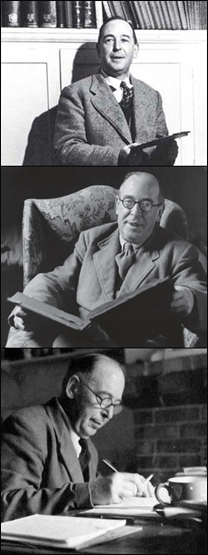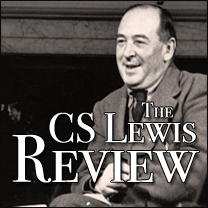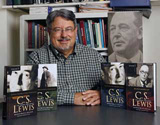
CSL the Scholar Christian
September 9th, 2005 | Skip to comments
Those who know C S Lewis only as a Christian apologist may underestimate and thus underprivilege his amazing output as a scholar. If we think he excels as a fantasist, what might his literary critic friends think of his scholarship? We don’t have to guess. As one of colleagues suggests,
“I went to some of his lectures on the ‘matter’ of Rome, France, and Britain, and remember how he made the dullest Latin text seem enthralling. . . ” (Kathleen Raine, Light on C. S. Lewis, 103)
Oddly enough, given his sterling reputation as an enthusiastic expositor of medieval and renaissance literature, C. S. Lewis disdained the practice of what we casually call “literary criticism,” and rejected out of hand the term “literary critic.” The term “literary historian” befit him best, since it calls attention to the primary motivation that characterized Lewis as a reader and as a lover of literature:. His own approach, expressed in a letter to Kathleen Raine only two weeks before his death, was to foreground “Plenty of fact, reasoning as brief and clear as English sunshine, and no personal comment at all.”
To read, he declared in his last and most visceral work of literary scholarship, An Experiment in Criticism (1961), is not to “aggrandize the self,” but rather to transcend it, to look through the eyes of others, and breaking through the provincialism of one’s own times. To read and to research with this goal forced the scholar to recognize that,
“in coming to understand anything we are rejecting the facts as they are for us in favor of the facts as they are.”
Lewis’s most enduring scholarly works–The Allegory of Love, A Preface to Paradise Lost, English Literature in the Sixteenth Century Excluding Drama, and The Discarded Image: An Introduction to Medieval and Renaissance Literature— have this in common: a desire to see with new eyes and to submerse oneself in the thrilling adventure of inhabiting an era external to one’s own, and thereby elucidating both. As he explains in his famous 1939 meditation on scholarship, “Learning in War-Time,”
Most of all, perhaps, we need intimate knowledge of the past. Not that the past has any magic about it, but because we cannot study the future, and yet need something to set against the present, to remind us that the basic assumptions have been quite different in different periods and that much which seems certain to the uneducated is merely temporary fashion. A man who has lived in many places is not likely to be deceived by the local errors of his native village; the scholar has lived in many times and is therefore in some degree immune from the great cataract of nonsense that pours from the press and the microphone of his own age.
The “scholarship” that results from such conviction is the genuine, earnestly disinterested report of the intrepid explorer who has experienced what it is to look through others’ eyes, to think as they have thought, to behave as they behaved within their cultural period.
If I were to describe Lewis myself in a single phrase, it would be this: Lewis was a man who knew he lived his life always before Pilate. That is to say, I believe Lewis carried out his daily tasks as scholar, citizen, and believer as one who knew he was always before a skeptical inquisitor, one who too often hides from the truth and masks his fear of knowing it behind indifference or the pretense of being on the search—as the demurring Pilate does in the presence of Our Lord (John 18:37). The antidote to such ennui or cynicism is not to adopt it for one’s own, but to transcend it, and to lift the eyes of one’s audience beyond the status quo, and onto the pursuit of truth.
(Excerpted from my article forthcoming in Christian History, November, 2005)




Comments
No comments yet.
RSS feed for comments on this post.
Sorry, the comment form is closed at this time.